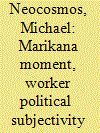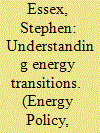| Srl | Item |
| 1 |
ID:
144804


|
|
|
|
|
| Summary/Abstract |
The flag suits the filthy landscape, and our jargon drowns the sound of the drum.
In the interior we shall nourish the most cynical prostitution. We shall massacre all logical revolts. To the spicy, softened countries! – At the service of the most monstrous industrial or military exploitation. Until we meet again; here, no matter where. Conscripts of our good will, we shall have a ferocious philosophy; ignorant of science, cunning for comfort; let the rest of the world perish. This is the real way forward; full march ahead! (Rimbaud, 1986)
|
|
|
|
|
|
|
|
|
|
|
|
|
|
|
|
| 2 |
ID:
168185


|
|
|
|
|
| Summary/Abstract |
This paper explores strategies deployed by a sample of white, British-born South Africans to account for their positions during apartheid and post-apartheid. Whereas literature on white racism identifies denial as a key strategy towards racial discrimination and the maintenance of privilege, the historical and political 10 context of South Africa makes this tactic implausible. The paper contributes to understandings of pluralism within white identifications through investigation of diverse discursive strategies used to frame the overtly racist, apartheid regime and the present post-apartheid, supposedly, ‘post-race’ state. A range of positions attempting to minimise individual implication are identified. 15 A common feature however is to reimagine the structure of social relations in order to diminish responsibility for the sins of the past or the success of the future; suggesting profound difficulties in adjusting to the new social reality.
|
|
|
|
|
|
|
|
|
|
|
|
|
|
|
|
| 3 |
ID:
167651


|
|
|
|
|
| Summary/Abstract |
This paper explores strategies deployed by a sample of white, British-born South Africans to account for their positions during apartheid and post-apartheid. Whereas literature on white racism identifies denial as a key strategy towards racial discrimination and the maintenance of privilege, the historical and political 10 context of South Africa makes this tactic implausible. The paper contributes to understandings of pluralism within white identifications through investigation of diverse discursive strategies used to frame the overtly racist, apartheid regime and the present post-apartheid, supposedly, ‘post-race’ state. A range of positions attempting to minimise individual implication are identified. 15 A common feature however is to reimagine the structure of social relations in order to diminish responsibility for the sins of the past or the success of the future; suggesting profound difficulties in adjusting to the new social reality.
|
|
|
|
|
|
|
|
|
|
|
|
|
|
|
|
| 4 |
ID:
168671


|
|
|
|
|
| Summary/Abstract |
There is increasing recognition that the prospects of a post-networked city challenges the myth of the modernist ideal of a networked city and offers a more realistic proposition for energy transitions in the global south. This paper examines the energy transitions involved in the development of South Africa's versions of the modern infrastructural ideal for electricity provision since the nineteenth century. Four phases of South Africa's energy transition are identified, consisting of colonial, apartheid, post-apartheid and low-carbon phases. The paper argues that the agendas influencing the generation, distribution and consumption of electricity in South Africa are multiple and potentially conflicting, which are emblematic of the limitations of the modern infrastructure ideal, particularly in relation to the formation of an ‘energy underclass’. Recognition and consideration of the potential uneven and differentiated spatial effects of energy transitions will continue to be integral to the planning and management of any transformations towards a post-networked city.
|
|
|
|
|
|
|
|
|
|
|
|
|
|
|
|